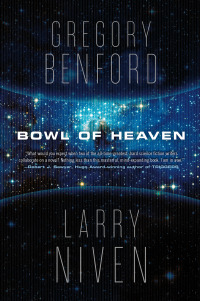Bowl of Heaven by Gregory Benford and Larry Niven
 Wednesday, October 17, 2012 at 6:33PM
Wednesday, October 17, 2012 at 6:33PM 
Published by Tor Books on October 16, 2012
Larry Niven has often worked in collaboration, and it's good to see him working at all, given his age. Not many writers born in 1938 are still kicking out science fiction. Gregory Benford might have manned the laboring oar but, having been born in 1941, he's not much younger. Ignoring the trendiness of modern sf, Benford and Niven have crafted an old-fashioned story of space exploration and first contact. Unfortunately, while I have enjoyed much of Niven's writing and at least some of Benford's over the years, Bowl of Heaven does not match the best work of either author.
The story begins as a promising (albeit conventional) "scientists journey to a new world" story. In the prolog, they are preparing to leave on their newly tested starship. As the novel begins, Cliff Kammash is awakened from an eight decade sleep, well before the ship is scheduled to reach the planet they have named Glory. Cliff, a biologist, thinks it odd that he has been awakened to opine about an unusual star the duty crew have observed -- odd until he realizes that the star is partially surrounded by a hemisphere, an object that was clearly manufactured. For reasons they can't explain, their ship has been losing velocity, and the knowledge that they aren't going to make it to Glory alive prompts them to investigate the bowl-covered star. The bowl is actually a vast (and literal) starship, using the star as its source of propulsion. Once they are inside the bowl, Cliff and his buddies discover an ecosystem the size of the inner solar system.
The plot then follows two branches as half the landing crew is captured by feathered aliens while the other half escapes. Both branches morph into wilderness survival tales as the two groups investigate the planet. For the most part, the story is bland and uninspired. Slightly more interesting are the underlying questions that the humans must confront: what is the origin of the bowl, where did it find its star, where is it going and why? One of the groups improbably stumbles upon a museum that provides helpful clues, furthering my impression that life inside the bowl is just a little too easy for our friends from Earth, a flaw that hurts the story's credibility. Eventually the humans discover what the reader learns much earlier: other aliens from other worlds are trapped in the bowl, in much the same predicament. The question then becomes: Why are the Big Birds who seem to be in charge rounding up and "assimilating" intelligent life forms from other planets?
The human characters lack distinctive personalities -- or any personalities. They are as bland as the story. They engage in random quarrels about points of science that have precious little to do with their survival, and a couple of them engage in hanky-panky, but for the most part the characters are interchangeably dull.
Bowl of Heaven works best when the focus shifts from the humans to the aliens. The Big Bird we encounter most often is Memor, who is charged first with understanding the humans and then with destroying them. The most interesting Bird chapters concern the aliens' attempt to understand the humans -- their speculation, for instance, about the evolutionary significance of facial gestures and human anatomy -- and the political consequences of Memor's repeated failures to bring them under control. The payoff comes when the reader meets a not-so-assimilated species that actually seems alien -- the politics of revolution comes into play -- but that doesn't happen until the novel's final chapters: too little and too late to redeem an uninspired plot.
The story hearkens back to an earlier, simpler era of science fiction in its conviction that humans, while not as technologically advanced as aliens, are clever and scrappy and so have the capacity to outwit their superior foes. Of course, it helps that the Big Birds are shockingly inept in their confrontations with humans.
Most disappointing is that the story ends abruptly -- not really a cliffhanger but leaving everything unresolved -- as the reader is encouraged to pick up volume two (Shipstar) to see what happens next. I'm sufficiently indifferent that I might not, but mildly curious about the unanswered questions noted above so maybe I will.
RECOMMENDED WITH RESERVATIONS
